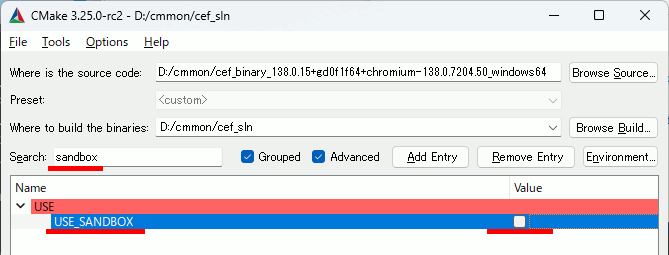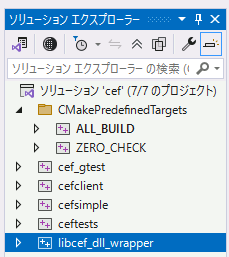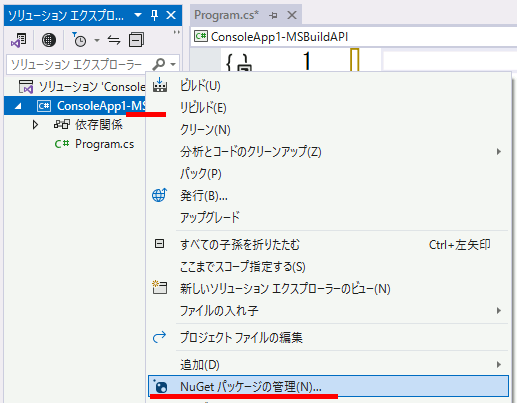CEFでオフスクリーンレンダリング
・settings.multi_threaded_message_loop = false; にする
・CefRenderHandler をオーバーライドしCefClientのインスタンスに設定
・イベントはSendMouseClickEvent等で送信
#ifndef WX_PRECOMP #include <wx/wx.h> #endif #include <wx/gdicmn.h> // wxPointに必要 #include <wx/frame.h> // wxFrameに必要 #ifdef _DEBUG #pragma comment(lib, "D:\\cmmon\\cef_binary_138.0.15+gd0f1f64+chromium-138.0.7204.50_windows64\\Debug\\libcef.lib") #pragma comment(lib, "D:\\cmmon\\MD\\Debug\\libcef_dll_wrapper.lib") #else #pragma comment(lib, "D:\\cmmon\\cef_binary_138.0.15+gd0f1f64+chromium-138.0.7204.50_windows64\\Release\\libcef.lib") #pragma comment(lib, "D:\\cmmon\\MD\\Release\\libcef_dll_wrapper.lib") #endif #include <wx/evtloop.h> ///////////////////////////////////// ///////////////////////////////////// ///////////////////////////////////// #include <include/cef_app.h> #include <string> wxBitmap FromRGBA(const unsigned char* rgba_buffer, int width, int height) { // wxImage用にRGBを抜き出す // 既存の生配列からstd::vectorへの変換例 std::vector<unsigned char> rgb_data(rgba_buffer, rgba_buffer + width * height * 3); for (int i = 0; i < width * height; ++i) { rgb_data[i * 3 + 0] = rgba_buffer[i * 4 + 2]; rgb_data[i * 3 + 1] = rgba_buffer[i * 4 + 1]; rgb_data[i * 3 + 2] = rgba_buffer[i * 4 + 0]; } wxImage image(width, height, rgb_data.data(), true); // wxBitmapへ変換 return wxBitmap(image); }
class MyRenderHandler : public CefRenderHandler { public: wxFrame* m_pFrame = nullptr; wxBitmap *m_pbitmap = nullptr; void setBitmap(wxBitmap *bmp) { m_pbitmap = bmp; } void setFrame(wxFrame* frame) { m_pFrame = frame; } // GetViewRect() をoverrideする // 必須:ビューポートのサイズを返す void GetViewRect(CefRefPtr<CefBrowser> browser, CefRect& rect) override { // ビューポートのサイズを返す rect = CefRect(0, 0, width_, height_); } // 必須:レンダリング結果がここに来る void OnPaint(CefRefPtr<CefBrowser> browser, PaintElementType type, const RectList& dirtyRects, const void* buffer, int width, int height) override { // ※ buffer は 32bit BGRA フォーマット *m_pbitmap = FromRGBA(static_cast<const unsigned char*>(buffer), width, height); if (m_pFrame) { m_pFrame->Refresh(); // ウィンドウを更新 } } // 例: サイズを外から設定 void SetSize(int w, int h) { width_ = w; height_ = h; } private: int width_ = 800; int height_ = 600; IMPLEMENT_REFCOUNTING(MyRenderHandler); };
class MyHandler : public CefClient, public CefLifeSpanHandler { // CefRefPtr<CefRenderHandler> renderHandler_; public: // MyHandler(CefRefPtr<CefRenderHandler> renderHandler) : renderHandler_(renderHandler) {} // CefRefPtr<CefRenderHandler> GetRenderHandler() override { return renderHandler_; } CefRefPtr<CefLifeSpanHandler> GetLifeSpanHandler() override { return this; } void OnAfterCreated(CefRefPtr<CefBrowser> browser) override { m_Browser = browser; } void OnBeforeClose(CefRefPtr<CefBrowser> browser) override { m_Browser = nullptr; // イベントから抜ける if (wxEventLoopBase::GetActive()) { wxEventLoopBase::GetActive()->Exit(); } } void CloseAllBrowsers(bool force_close) { if (m_Browser) { m_Browser->GetHost()->CloseBrowser(force_close); } } CefRefPtr<CefBrowser> GetBrowser() { return m_Browser; } IMPLEMENT_REFCOUNTING(MyHandler); private: CefRefPtr<CefBrowser> m_Browser; };
class MyCustomEventLoop : public wxGUIEventLoop { public: MyCustomEventLoop() = default; virtual ~MyCustomEventLoop() = default; protected: // Yieldが必要な場合 virtual void DoYieldFor(long eventsToProcess) override { // デフォルトの実装 wxGUIEventLoop::DoYieldFor(eventsToProcess); } // メッセージループの各イテレーション開始時に呼ばれるフック virtual void OnNextIteration() override { // デフォルトの実装 wxGUIEventLoop::OnNextIteration(); } ////////////////////////////////////////////// // メッセージを処理する bool Dispatch() override { bool running = true; MSG msg; while (::PeekMessage(&msg, NULL, 0, 0, PM_REMOVE)) { if (msg.message == WM_QUIT) running = false; else { ::TranslateMessage(&msg); ::DispatchMessage(&msg); } } CefDoMessageLoopWork(); ::Sleep(10); return true; // まだ継続 } ////////////////////////////////////////////// };
// メインフレーム class MyFrame : public wxFrame { CefRefPtr<MyHandler> g_handler; wxBitmap m_cefbmp; public: MyFrame() : wxFrame(nullptr, wxID_ANY, "CEF Offscreen Rendering") { Bind(wxEVT_CLOSE_WINDOW, &MyFrame::OnClose, this); Bind(wxEVT_SIZE, &MyFrame::OnSize, this); Bind(wxEVT_PAINT, &MyFrame::OnPaint, this); Bind(wxEVT_LEFT_DOWN, &MyFrame::OnLButtonDown, this); Bind(wxEVT_LEFT_UP, &MyFrame::OnLButtonUp, this); CallAfter(&MyFrame::PostCreate); } private:
void OnLButtonDown(wxMouseEvent& event) { CefMouseEvent mouse_event; mouse_event.x = event.GetX(); mouse_event.y = event.GetY(); mouse_event.modifiers = event.GetModifiers(); // マウスボタンDOWN g_handler->GetBrowser()->GetHost()->SendMouseClickEvent( mouse_event, MBT_LEFT, false, // isMouseUp == false (DOWN) 1 ); event.Skip(); // 必要なら他のハンドラにも渡す }
void OnLButtonUp(wxMouseEvent& event) { CefMouseEvent mouse_event; mouse_event.x = event.GetX(); mouse_event.y = event.GetY(); mouse_event.modifiers = event.GetModifiers(); // マウスボタンUP g_handler->GetBrowser()->GetHost()->SendMouseClickEvent( mouse_event, MBT_LEFT, true, // isMouseUp == true (UP) 1 ); event.Skip(); }
void PostCreate() { CefRefPtr<MyRenderHandler> renderHandler = new MyRenderHandler(); renderHandler->setBitmap(&m_cefbmp); renderHandler->setFrame(this); renderHandler->SetSize(400, 400); // ビューポートのサイズを設定 g_handler = CefRefPtr<MyHandler>(new MyHandler(renderHandler) ); CefBrowserSettings browser_settings; CefWindowInfo window_info; CefRect cefRect( 0, 0, 400, 400); HWND hwnd = (HWND)this->GetHandle(); //window_info.SetAsChild(hwnd, cefRect); // オフスクリーンレンダリング window_info.SetAsWindowless(nullptr); CefBrowserHost::CreateBrowser( window_info, g_handler, "https://www.google.com", browser_settings, nullptr, nullptr); this->Layout(); // レイアウトの更新 } void OnClose(wxCloseEvent& evt) { // CEFのブラウザを閉じる g_handler->CloseAllBrowsers(true); // ウィンドウを閉じない指示 evt.Veto(); } void OnSize(wxSizeEvent& evt) { if (g_handler) { HWND hBrowserWnd = g_handler->GetBrowser()->GetHost()->GetWindowHandle(); // ウィンドウサイズ変更時の処理 if (g_handler && g_handler->GetBrowser()) { RECT rect(0, 0, evt.GetSize().GetWidth(), evt.GetSize().GetHeight()); SetWindowPos(hBrowserWnd, NULL, 0, 0, rect.right - rect.left, rect.bottom - rect.top, SWP_NOZORDER); // ブラウザにサイズ変更を通知 g_handler->GetBrowser()->GetHost()->WasResized(); } } evt.Skip(); // イベントをスキップしてデフォルトの処理を行う } // OnPaint() void OnPaint(wxPaintEvent& evt) { // 描画処理をここに追加 wxPaintDC dc(this); if (m_cefbmp.IsOk()) { // CEFのビットマップを描画 dc.DrawBitmap(m_cefbmp, 0, 0, true); } } }; class MyApp : public wxApp { public: bool OnInit() override { HINSTANCE hInstance = ::GetModuleHandle(NULL); CefMainArgs main_args(hInstance); int exit_code = CefExecuteProcess(main_args, nullptr, nullptr); if (exit_code >= 0) return false; // CEFの設定 CefSettings settings; settings.no_sandbox = true; // マルチスレッドメッセージループを無効にする // オフスクリーンレンダリングでは false必須 settings.multi_threaded_message_loop = false; CefInitialize(main_args, settings, nullptr, nullptr); /////////////////////////////////////////////////// auto frame = new MyFrame(); frame->Show(); return true; } int OnRun() override { // wxGUIEventLoop を使って自前ループを構築 MyCustomEventLoop* loop = new MyCustomEventLoop; wxEventLoopBase::SetActive(loop); // アクティブなループとして登録 int retval = loop->Run(); // ここでメッセージループ開始 delete loop; // ループ終了後に解放 // CEFのシャットダウン CefShutdown(); return retval; } virtual int OnExit() { return wxApp::OnExit(); } }; // WinMainをマクロで定義 wxIMPLEMENT_APP(MyApp);
CEFをwxWidgetsのウィンドウに貼り付ける(settings.multi_threaded_message_loop = false)
#ifndef WX_PRECOMP #include <wx/wx.h> #endif #include <wx/gdicmn.h> // wxPointに必要 #include <wx/frame.h> // wxFrameに必要 #ifdef _DEBUG #pragma comment(lib, "D:\\cmmon\\cef_binary_138.0.15+gd0f1f64+chromium-138.0.7204.50_windows64\\Debug\\libcef.lib") #pragma comment(lib, "D:\\cmmon\\MD\\Debug\\libcef_dll_wrapper.lib") #else #pragma comment(lib, "D:\\cmmon\\cef_binary_138.0.15+gd0f1f64+chromium-138.0.7204.50_windows64\\Release\\libcef.lib") #pragma comment(lib, "D:\\cmmon\\MD\\Release\\libcef_dll_wrapper.lib") #endif #include <wx/evtloop.h> ///////////////////////////////////// ///////////////////////////////////// ///////////////////////////////////// #include <include/cef_app.h> #include <string>
class MyHandler : public CefClient, public CefLifeSpanHandler { public: MyHandler() {} CefRefPtr<CefLifeSpanHandler> GetLifeSpanHandler() override { return this; } void OnAfterCreated(CefRefPtr<CefBrowser> browser) override { m_Browser = browser; } void OnBeforeClose(CefRefPtr<CefBrowser> browser) override { m_Browser = nullptr; // イベントから抜ける if (wxEventLoopBase::GetActive()) { wxEventLoopBase::GetActive()->Exit(); } } void CloseAllBrowsers(bool force_close) { if (m_Browser) { m_Browser->GetHost()->CloseBrowser(force_close); } } CefRefPtr<CefBrowser> GetBrowser() { return m_Browser; } IMPLEMENT_REFCOUNTING(MyHandler); private: CefRefPtr<CefBrowser> m_Browser; };
class MyCustomEventLoop : public wxGUIEventLoop { public: MyCustomEventLoop() = default; virtual ~MyCustomEventLoop() = default; protected: // Yieldが必要な場合 virtual void DoYieldFor(long eventsToProcess) override { // デフォルトの実装 wxGUIEventLoop::DoYieldFor(eventsToProcess); } // メッセージループの各イテレーション開始時に呼ばれるフック virtual void OnNextIteration() override { // デフォルトの実装 wxGUIEventLoop::OnNextIteration(); } ////////////////////////////////////////////// // メッセージを処理する bool Dispatch() override { bool running = true; MSG msg; while (::PeekMessage(&msg, NULL, 0, 0, PM_REMOVE)) { if (msg.message == WM_QUIT) running = false; else { ::TranslateMessage(&msg); ::DispatchMessage(&msg); } } CefDoMessageLoopWork(); ::Sleep(10); return true; // まだ継続 } ////////////////////////////////////////////// };
// メインフレーム class MyFrame : public wxFrame { CefRefPtr<MyHandler> g_handler; public: MyFrame() : wxFrame(nullptr, wxID_ANY, "メッセージループ") { Bind(wxEVT_CLOSE_WINDOW, &MyFrame::OnClose, this); Bind(wxEVT_SIZE, &MyFrame::OnSize, this); CallAfter(&MyFrame::PostCreate); } private: void PostCreate() { g_handler = CefRefPtr<MyHandler>(new MyHandler); CefBrowserSettings browser_settings; CefWindowInfo window_info; CefRect cefRect( 0, 0, 400, 400); HWND hwnd = (HWND)this->GetHandle(); window_info.SetAsChild(hwnd, cefRect); CefBrowserHost::CreateBrowser( window_info, g_handler, "https://www.google.com", browser_settings, nullptr, nullptr); this->Layout(); // レイアウトの更新 } void OnClose(wxCloseEvent& evt) { // CEFのブラウザを閉じる g_handler->CloseAllBrowsers(true); // ウィンドウを閉じない指示 evt.Veto(); } void OnSize(wxSizeEvent& evt) { if (g_handler) { HWND hBrowserWnd = g_handler->GetBrowser()->GetHost()->GetWindowHandle(); // ウィンドウサイズ変更時の処理 if (g_handler && g_handler->GetBrowser()) { RECT rect(0, 0, evt.GetSize().GetWidth(), evt.GetSize().GetHeight()); SetWindowPos(hBrowserWnd, NULL, 0, 0, rect.right - rect.left, rect.bottom - rect.top, SWP_NOZORDER); // ブラウザにサイズ変更を通知 g_handler->GetBrowser()->GetHost()->WasResized(); } } evt.Skip(); // イベントをスキップしてデフォルトの処理を行う } }; class MyApp : public wxApp { public: bool OnInit() override { HINSTANCE hInstance = ::GetModuleHandle(NULL); CefMainArgs main_args(hInstance); int exit_code = CefExecuteProcess(main_args, nullptr, nullptr); if (exit_code >= 0) return false; // CEFの設定 CefSettings settings; settings.no_sandbox = true; // マルチスレッドメッセージループを無効にする settings.multi_threaded_message_loop = false; CefInitialize(main_args, settings, nullptr, nullptr); /////////////////////////////////////////////////// auto frame = new MyFrame(); frame->Show(); return true; } int OnRun() override { // wxGUIEventLoop を使って自前ループを構築 MyCustomEventLoop* loop = new MyCustomEventLoop; wxEventLoopBase::SetActive(loop); // アクティブなループとして登録 int retval = loop->Run(); // ここでメッセージループ開始 delete loop; // ループ終了後に解放 // CEFのシャットダウン CefShutdown(); return retval; } virtual int OnExit() { return wxApp::OnExit(); } }; // WinMainをマクロで定義 wxIMPLEMENT_APP(MyApp);
wxWidgetsのメッセージループを上書きする
wxWidgetsはメッセージループを隠蔽している。これを加工する。
wxGUIEventLoopを継承して、必要な機能のみ実装する。
#ifndef WX_PRECOMP #include <wx/wx.h> #endif #include <wx/gdicmn.h> // wxPointに必要 #include <wx/frame.h> // wxFrameに必要 #include <wx/evtloop.h> ///////////////////////////////////// ///////////////////////////////////// ///////////////////////////////////// #include <string> class MyCustomEventLoop : public wxGUIEventLoop { public: MyCustomEventLoop() = default; virtual ~MyCustomEventLoop() = default; protected:
// Yieldが必要な場合 virtual void DoYieldFor(long eventsToProcess) override { // デフォルトの実装 wxGUIEventLoop::DoYieldFor(eventsToProcess); }
// メッセージループの各イテレーション開始時に呼ばれるフック virtual void OnNextIteration() override { ////////////////////////////////// static int counter = 0; counter++; char ss[64]; snprintf(ss, sizeof(ss), "OnNextIteration called: %d", counter); wxLogDebug(ss); ////////////////////////////////// // デフォルトの実装 wxGUIEventLoop::OnNextIteration(); }
////////////////////////////////////////////// // メッセージを処理する bool Dispatch() override { MSG msg;// メッセージループの処理はOS依存 if (!::GetMessage(&msg, NULL, 0, 0)) return false; // WM_QUIT if (msg.message == WM_LBUTTONDOWN)// 処理例:WM_LBUTTONDOWNを無効化 { wxLogDebug("Ignored in custom Dispatch"); // WM_LBUTTONDOWN このメッセージを処理しないためにここでtrueを返す return true; } ProcessMessage(&msg); return true; } //////////////////////////////////////////////
// イベント処理のメインループ // *メッセージループ中に何かしたいだけなら、OnNextIteration() をオーバーライドするだけでよい // *メッセージを横取りするような用途では、Dispatch() をオーバーライドするだけでよい // より細かい制御が必要なら DoRun() をオーバーライドすることもできる #define IF_YOU_NEED_DORUN #if defined( IF_YOU_NEED_DORUN ) virtual int DoRun() override { for (;;) { // 1) ループ開始フック OnNextIteration(); // 2) キュー内の全イベントを処理 while (!m_shouldExit && Pending()) { // Dispatch() が false を返したらループ終了 if (!Dispatch()) break; } if (m_shouldExit) break; // 3) アイドル処理:戻り値 true なら更にアイドルイベントを送り続ける if (ProcessIdle()) { continue; } // 4) 何もやることがなければ少し待機 wxThread::Sleep(10); } // 返り値は Exit() でセットされたコード return m_exitcode; } #endif // IF_YOU_NEED
}; class MyFrame : public wxFrame { public: MyFrame() : wxFrame(nullptr, wxID_ANY, "メッセージループ") { Bind(wxEVT_CLOSE_WINDOW, &MyFrame::OnClose, this); // クリックイベント Bind(wxEVT_LEFT_DOWN, [](wxMouseEvent& event) { wxLogMessage("Left mouse button clicked at (%d, %d)", event.GetX(), event.GetY()); }); } private: void OnClose(wxCloseEvent& evt) {
if (wxEventLoopBase::GetActive()) wxEventLoopBase::GetActive()->Exit();// プログラム終了
evt.Skip(); // フレーム自体も閉じる } }; class MyApp : public wxApp { public: bool OnInit() override { auto frame = new MyFrame(); frame->Show(); return true; } int OnRun() override { // wxGUIEventLoop を使って自前ループを構築 MyCustomEventLoop* loop = new MyCustomEventLoop; wxEventLoopBase::SetActive(loop); // アクティブなループとして登録 int retval = loop->Run(); // ここでメッセージループ開始 delete loop; // ループ終了後に解放 return retval; } }; // WinMainをマクロで定義 wxIMPLEMENT_APP(MyApp);
CEFをwxWidgetsのウィンドウに貼り付ける
CEFをwxWidgetsの上に貼り付けてみる。注意点として、配布されたdllではdebugモードで実行できないらしい。必ずReleaseモードで実行する。
#ifndef WX_PRECOMP #include <wx/wx.h> #endif #include <wx/gdicmn.h> // wxPointに必要 #include <wx/frame.h> // wxFrameに必要 #include <include/cef_app.h> #pragma comment(lib, "D:\\cmmon\\cef_binary_138.0.15+gd0f1f64+chromium-138.0.7204.50_windows64\\Release\\libcef.lib") #pragma comment(lib, "D:\\cmmon\\MD\\Release\\libcef_dll_wrapper.lib") ///////////////////////////////////// ///////////////////////////////////// ///////////////////////////////////// #include <string>
class MyHandler : public CefClient, public CefLifeSpanHandler { public: MyHandler() {} CefRefPtr<CefLifeSpanHandler> GetLifeSpanHandler() override { return this; } void OnAfterCreated(CefRefPtr<CefBrowser> browser) override { m_Browser = browser; } void OnBeforeClose(CefRefPtr<CefBrowser> browser) override { m_Browser = nullptr; } void CloseAllBrowsers(bool force_close) { if (m_Browser) { m_Browser->GetHost()->CloseBrowser(force_close); } } IMPLEMENT_REFCOUNTING(MyHandler); private: CefRefPtr<CefBrowser> m_Browser; };
// ウィンドウ作成 class MyFrame : public wxFrame {
CefRefPtr<MyHandler> g_handler;
public: void PostCreate() {
g_handler = CefRefPtr<MyHandler>(new MyHandler); CefBrowserSettings browser_settings; CefWindowInfo window_info; CefRect cefRect( 0, 0, 400, 400); HWND hwnd = (HWND)this->GetHandle(); window_info.SetAsChild(hwnd, cefRect); CefBrowserHost::CreateBrowser( window_info, g_handler, "https://www.google.com", browser_settings, nullptr, nullptr);
this->Layout(); // レイアウトの更新 } void OnClose(wxCloseEvent& event) {
// CEFのブラウザを閉じる g_handler->CloseAllBrowsers(true);
event.Skip(); // デフォルトの処理を実行 } MyFrame(const wxString& title, const wxPoint& pos, const wxSize& size) : wxFrame(NULL, wxID_ANY, title, pos, size) { // CallAfter : 現在処理中のイベントが終わったらPostCreateを実行 // コンストラクタはウィンドウ生成イベント扱い CallAfter(&MyFrame::PostCreate); } private: }; ///////////////////////////////////// ///////////////////////////////////// ///////////////////////////////////// // wxWidgetsのアプリケーション作成 class MyApp : public wxApp { public: virtual bool OnInit() {
HINSTANCE hInstance = ::GetModuleHandle(NULL); CefMainArgs main_args(hInstance); int exit_code = CefExecuteProcess(main_args, nullptr, nullptr); if (exit_code >= 0) return false; // CEFの設定 CefSettings settings; settings.no_sandbox = true; // マルチスレッドメッセージループを有効にする settings.multi_threaded_message_loop = true; CefInitialize(main_args, settings, nullptr, nullptr);
/////////////////////////////////////////////////// MyFrame* frame = new MyFrame("Hello World", wxPoint(50, 50), wxSize(450, 340)); frame->Show(true); return true; } virtual int OnExit() {
// CEFのシャットダウン CefShutdown();
return wxApp::OnExit(); } }; ///////////////////////////////////// ///////////////////////////////////// ///////////////////////////////////// // WinMainをマクロで定義 wxIMPLEMENT_APP(MyApp);
Chromium Embedded Framework(2)ウィンドウに張り付ける
Win32apiのCreateWindowのhwndにChromeを張り付ける。
CefRunMessageLoop 版
CefRunMessageLoopを使用すると、メッセージループにCEFのものを使う。
#include <windows.h> #include <iostream> #include <include/cef_app.h> #ifdef _DEBUG #pragma comment(lib, "D:\\cmmon\\cef_binary_138.0.15+gd0f1f64+chromium-138.0.7204.50_windows64\\Debug\\libcef.lib") #pragma comment(lib, "D:\\cmmon\\MD\\Debug\\libcef_dll_wrapper.lib") #else #pragma comment(lib, "D:\\cmmon\\cef_binary_138.0.15+gd0f1f64+chromium-138.0.7204.50_windows64\\Release\\libcef.lib") #pragma comment(lib, "D:\\cmmon\\MD\\Release\\libcef_dll_wrapper.lib") #endif
class MyHandler : public CefClient , public CefLifeSpanHandler { public: MyHandler() {} CefRefPtr<CefLifeSpanHandler> GetLifeSpanHandler() override { return this; } void OnAfterCreated(CefRefPtr<CefBrowser> browser) override { m_Browser = browser; } void OnBeforeClose(CefRefPtr<CefBrowser> browser) override { m_Browser = nullptr; } void CloseAllBrowsers(bool force_close) { if (m_Browser) { m_Browser->GetHost()->CloseBrowser(force_close); } } IMPLEMENT_REFCOUNTING(MyHandler); private: CefRefPtr<CefBrowser> m_Browser; };
class MyApp : public CefApp { IMPLEMENT_REFCOUNTING(MyApp); };
LRESULT CALLBACK WndProc(HWND hwnd, UINT msg, WPARAM wp, LPARAM lp) { MyHandler* handler; LPCREATESTRUCT pcs; switch (msg) { case WM_CLOSE:
handler = (MyHandler*)GetWindowLongPtr(hwnd, GWLP_USERDATA); if (handler) { handler->CloseAllBrowsers(true); }
DestroyWindow(hwnd); return 0; case WM_CREATE:
pcs = (LPCREATESTRUCT)lp; handler = (MyHandler *)pcs->lpCreateParams; SetWindowLongPtr(hwnd, GWLP_USERDATA, (LONG_PTR)(handler));
return 0; case WM_DESTROY:
CefQuitMessageLoop();
PostQuitMessage(0); return 0; } return DefWindowProc(hwnd, msg, wp, lp); } int WINAPI WinMain(HINSTANCE hInstance, HINSTANCE hPrevInstance, LPSTR lpCmdLine, int nCmdShow) { /////////////////////////////////////////////////////////////////////////
CefMainArgs main_args(hInstance); CefRefPtr<MyApp> app(new MyApp); // MyAppのインスタンス用のポインタ // サブプロセス処理 int exit_code = CefExecuteProcess(main_args, app, nullptr); if (exit_code >= 0) return exit_code; // CEFの設定 CefSettings settings; settings.no_sandbox = true; CefInitialize(main_args, settings, app, nullptr);
///////////////////////////////////////////////////////////////////////// HWND hwnd; MSG msg; WNDCLASS winc; winc.style = CS_HREDRAW | CS_VREDRAW; winc.lpfnWndProc = WndProc; winc.cbClsExtra = winc.cbWndExtra = 0; winc.hInstance = hInstance; winc.hIcon = LoadIcon(NULL, IDI_APPLICATION); winc.hCursor = LoadCursor(NULL, IDC_ARROW); winc.hbrBackground = (HBRUSH)GetStockObject(WHITE_BRUSH); winc.lpszMenuName = NULL; winc.lpszClassName = TEXT("SZL-WND"); if (!RegisterClass(&winc)) return -1;
CefRefPtr<MyHandler> g_handler = CefRefPtr<MyHandler>(new MyHandler);
hwnd = CreateWindow( TEXT("SZL-WND"), TEXT("CEF test"), WS_OVERLAPPEDWINDOW | WS_VISIBLE, CW_USEDEFAULT, CW_USEDEFAULT, CW_USEDEFAULT, CW_USEDEFAULT, NULL, NULL, hInstance, g_handler.get() ); if (hwnd == NULL) return -1;
CefRefPtr<CefClient> client = g_handler; // 型は CefClient で渡す CefBrowserSettings browser_settings; CefWindowInfo window_info; RECT rect; GetClientRect(hwnd, &rect); // 親ウィンドウのクライアント領域 CefRect cefRect( rect.left, rect.top, rect.right - rect.left, rect.bottom - rect.top); window_info.SetAsChild(hwnd, cefRect); CefBrowserHost::CreateBrowser( window_info, g_handler, "https://www.google.com", browser_settings, nullptr, nullptr); CefRunMessageLoop(); // メッセージループ // settings.multi_threaded_message_loop = true;の時はコメントアウトすること CefShutdown(); // CEF終了処理
return 0; }
メッセージループ自前版
CefRunMessageLoopを使わない場合、メッセージループは自分で書き、CEFのメッセージを処理するためにループ内で CefDoMessageLoopWork() を呼び出す。
また、CefDoMessageLoopWork内でPeekMessageを呼んでいる関係でWM_QUITを検知できなくなるので、GetMessageを使わずにMsgWaitForMultipleObjectsとPeekMessageでメッセージループを管理する。
// CefRunMessageLoop(); // メッセージループ // 注意 GetMessageは使わない // CefDoMessageLoopWorkは中でPeekMessageを使っている // PeekMessage は強制的にWM_QUITを取り出してしまうので、 // こちら側でGetMessageをつかうと先にWM_QUITを取り出されて // 終了を感知できなくなりループから抜け出せなくなる // **CefDoMessageLoopWorkは内部でタイマーイベントなどを多数キューに投げているので、 // **GetMessageがタイマーを補足し、次に入っていたWM_QUITはCefDoMessageLoopWorkが取り出すという // **現象が起こる // bool should_quit = false; while (!should_quit) { // MsgWaitForMultipleObjects = メッセージが来るまでスレッドをスリープ DWORD result = MsgWaitForMultipleObjects(0, NULL, FALSE, INFINITE, QS_ALLINPUT); // もし何かメッセージが来たら処理 if (result == WAIT_OBJECT_0) { while (PeekMessage(&msg, NULL, 0, 0, PM_REMOVE)) { if (msg.message == WM_QUIT) { should_quit = true; } else { TranslateMessage(&msg); DispatchMessage(&msg); } } } if (!should_quit) { CefDoMessageLoopWork(); } }
multi_threaded_message_loop 版
multi_threaded_message_loopをtrueに設定すると、CEFが専用スレッドで動く。この場合、CefRunMessageLoop(),CefShutdown()を使用してはいけない。
メッセージループは自プログラムのメッセージだけを処理する。
CefSettings settings; settings.no_sandbox = true; settings.multi_threaded_message_loop = true; // を指定して専用スレッドでCEFを動かす場合、 // CefRunMessageLoop()も CefDoMessageLoopWork() も CefShutdown() も使ってはいけない /* ... */ while (GetMessage(&msg, NULL, 0, 0)) { TranslateMessage(&msg); DispatchMessage(&msg); } // 使わない CefRunMessageLoop(); // settings.multi_threaded_message_loop = true;の時はコメントアウトすること // 使わない CefShutdown(); return 0;// msg.wParam; }
Chromium Embedded Frameworkを試す(1)
CEFはアプリケーションにChromeを組み込むためのフレームワークである(辞書的説明)。用は自アプリにChromeの機能を埋め込むためのライブラリ。
導入
ダウンロード
以下からビルド済みライブラリをダウンロード:
https://cef-builds.spotifycdn.com/index.html
CMake
ライブラリ自体はビルド済みだが、C++から使用するにはwrapper dllをビルドした方がよい。このためにCMakeする。
使用時、/MD でリンクしたいなら、必ずUSE_SANDBOX=OFFにする。
これはCEFが持っているsandboxという機能が/MTでビルドされているからで、この/MDバージョンは用意されていない。使う場合はCEFのビルドそのものをやらないといけなくなる。sandboxを使わないとセキュリティが下がるらしいが、とりあえず当分配布するものは作らないのでsandboxをOFFにする。

ビルド
libcef_dll_wrapperをビルドする。他のものはサンプルなので無視してもいい。
今回はlibcef_dll_wrapperを/MDに設定して、libcef_dll_wrapperを右クリック→ビルド でビルドする。

・libcef_dll_wrapper/Release/libcef_dll_wrapper.lib
・libcef_dll_wrapper/Debug/libcef_dll_wrapper.lib
が生成される。
サンプル実行
一応、ALL_BUILDしたcefsimpleを実行してみる。
上ではlibcef_dll_wrapperだけビルドする話をした。当然ALL_BUILDもできるが全てのプロジェクトで/MDまたは/MTに統一する必要がある。
あと、cefsimple.exeは二つ起動すると二つ目がChromeのウィンドウになるという謎動作をする。

Ubuntuにpyenv-virtualenvを導入
pyenv-virtualenvを使用すれば、Python 環境のバージョンを含めた作業環境の切り替えが出来る。
pyenv
libbz2-dev libreadline-dev libsqlite3-dev curl \
libncursesw5-dev xz-utils tk-dev libxml2-dev \
libxmlsec1-dev libffi-dev liblzma-dev git
設定
~/.profile
export PATH="$PYENV_ROOT/bin:$PATH"
eval "$(pyenv init --path)"
~/.bashrc
export PYENV_ROOT="$HOME/.pyenv"
export PATH="$PYENV_ROOT/bin:$PATH"
eval "$(pyenv init -)"
eval "$(pyenv virtualenv-init -)"
設定を反映
pyenv 使用例
python 3.11.2のインストール
環境作成
環境 有効化
C++で .vcxproj , .csproj を解析・書き換え
.vcxprojとcsprojはxmlなので、pugixmlで内容を解析できる。例えばプロジェクト名を変えてみる。
#include <iostream> #include <fstream> #include "pugixml.hpp"
// vcxprojファイルへのアクセスと編集 void vcxproj(std::string vcxproj_path) { pugi::xml_document doc; doc.load_file(vcxproj_path.c_str()); pugi::xml_node property_group; pugi::xml_node project = doc.child("Project"); for (pugi::xml_node node : project.children("PropertyGroup")) { if (node.attribute("Label") && std::string(node.attribute("Label").value()) == "Globals") { property_group = node; break; } } // プロジェクト名を取得 pugi::xml_node root_namespace = property_group.child("RootNamespace"); std::cout << root_namespace.child_value();
// プロジェクト名を編集 root_namespace.text().set("MyNewProjectName"); doc.save_file(vcxproj_path.c_str()); }
// csprojファイルへのアクセスと編集 void csproj(std::string csproj_path) { pugi::xml_document doc; doc.load_file(csproj_path.c_str()); pugi::xml_node project = doc.child("Project"); pugi::xml_node root_namespace; for (pugi::xml_node node : project.children("PropertyGroup")) { pugi::xml_node candidate = node.child("RootNamespace"); if (candidate) { root_namespace = candidate; break; } } // プロジェクト名を取得 std::cout << root_namespace.text().as_string() << std::endl; // プロジェクト名を編集 root_namespace.text().set("MyNewProjectName"); doc.save_file(csproj_path.c_str()); }
int main() { std::string cs_proj_path = R"(C:\test\ConsoleApp1-SCharpProj\ConsoleApp1-SCharpProj.csproj)"; std::string vc_proj_path = R"(C:\test\ConsoleAppl-CPPProj\ConsoleAppl-CPPProj.vcxproj)"; csproj(cs_proj_path); vcxproj(vc_proj_path); }
C++で.slnファイルを解析
VC++の.slnファイルを解析するよい方法が見つからないので書いてみた。
.slnファイルは独自形式だが、同時に単純かつ厳密なフォーマットらしいので割と簡単に書ける。
https://suzulang.com/wp-content/uploads/2025/06/winslnrw.zip
#include <iostream> #include <list> #include <memory> #include <string> #include <vector> #include <fstream> #include <unordered_map> #include <stack> #include <regex> /////////////////////////////////////////////////////////////////// /////////////////////////////////////////////////////////////////// /////////////////////////////////////////////////////////////////// // std::stringから先頭の空白を削除する関数 std::string trimLeadingWhitespace(const std::string& str) { size_t start = str.find_first_not_of(" \t\n\r"); return (start == std::string::npos) ? "" : str.substr(start); } // std::stringから、冒頭のアルファベットのみの文字列を取得。 std::string getLeadingAlphabet(const std::string& str) { size_t end = str.find_first_not_of("abcdefghijklmnopqrstuvwxyzABCDEFGHIJKLMNOPQRSTUVWXYZ"); return (end == std::string::npos) ? str : str.substr(0, end); } bool isSectionMarks(const std::string& str) { // セクションの開始を示す文字列かどうかを判定 // ここでは例として "Project" と "Global" をセクションの開始とする return str == "Project" || str == "ProjectSection" || str == "EndProjectSection" || str == "EndProject" || str == "Global" || str == "GlobalSection" || str == "EndGlobalSection" || str == "EndGlobal" ; }
// slnファイルの各行を表すクラス class LineData { protected: std::string line; public: void setLine(const std::string& text) { line = text; } const std::string& getLine() const { return line; } std::string& getLine() { return line; } };
// ヘッダはセクション扱いとはしないで各行を独自の情報とみなす class HeaderLine :public LineData { protected: std::regex pattern; public: HeaderLine(std::string pat) :pattern(pat) { } virtual std::string getVersion() const{ std::string text = getLine(); std::smatch match; std::regex_search(text, match, pattern); return text.substr(match.position(1), match.length(1)); } virtual void setVersion(const std::string& newvalue) { std::string text = getLine(); std::smatch match; std::regex_search(text, match, pattern); text.replace(match.position(1), match.length(1), newvalue); setLine(text); } };
// Visual Studioのバージョン情報を保持するクラス class VisualStudioVersion : public HeaderLine { public: VisualStudioVersion(): HeaderLine(R"(^VisualStudioVersion\s*=\s*([0-9.]+))") { } };
// 最小Visual Studioのバージョン情報を保持するクラス class MinimumVisualStudioVersion : public HeaderLine { public: MinimumVisualStudioVersion(): HeaderLine(R"(^MinimumVisualStudioVersion\s*=\s*([0-9.]+))") { } };
// ソリューションファイルのフォーマットバージョンを保持するクラス class FormatVersion : public HeaderLine { public: FormatVersion(): HeaderLine(R"(Format Version ([0-9.]+))") { } };
enum class HeaderLineTypeT { HL_VisualStudioVersion, HL_MinimumVisualStudioVersion, HL_FormatVersion, HL_ERROR }; HeaderLineTypeT HeaderLineType(const std::string& line) { std::regex format_version_regex(R"(Format Version ([0-9.]+))"); std::regex visual_studio_version_regex(R"(^VisualStudioVersion\s*=\s*([0-9.]+))"); std::regex minimum_visual_studio_version_regex(R"(^MinimumVisualStudioVersion\s*=\s*([0-9.]+))"); std::smatch match; if (std::regex_search(line, match, format_version_regex)) { return HeaderLineTypeT::HL_FormatVersion; } else if (std::regex_search(line, match, visual_studio_version_regex)) { return HeaderLineTypeT::HL_VisualStudioVersion; } else if (std::regex_search(line, match, minimum_visual_studio_version_regex)) { return HeaderLineTypeT::HL_MinimumVisualStudioVersion; } return HeaderLineTypeT::HL_ERROR; }
using SlnFileLineSPtr = std::shared_ptr<LineData>;
class Section : public std::enable_shared_from_this<Section> { protected: std::list< SlnFileLineSPtr > ::iterator head; std::list< SlnFileLineSPtr > ::iterator tail; std::string _sectionType; public: std::list < std::shared_ptr<Section> > subSections; // サブセクションのリスト std::shared_ptr<Section> This() { return shared_from_this(); } std::list < std::shared_ptr<Section> >& getSubSections(){ // グローバルセクションのサブセクションを取得するメソッド return subSections; } virtual void update() {} Section(std::string sectionname, std::list< SlnFileLineSPtr >::iterator shead) { head = shead; _sectionType = sectionname; } std::string getSectionType()const { return _sectionType; } void setSectionTail(std::list< SlnFileLineSPtr >::iterator stail) { tail = stail; } std::list< SlnFileLineSPtr > ::iterator getSectionBegin() const { return head; } std::list< SlnFileLineSPtr > ::iterator getSectionTail() const { return tail; } std::list< SlnFileLineSPtr > ::iterator getSectionEnd() const { auto itr = tail; itr++; return itr; } };
class GlobalSection : public Section { protected: std::string* sectionHeadLine() { return & (*getSectionBegin())->getLine(); } const std::string* sectionHeadLine() const{ return & (*getSectionBegin())->getLine(); } std::regex Pattern; public: GlobalSection(std::string sectionname, std::list< SlnFileLineSPtr >::iterator line):Section(sectionname,line) { Pattern = std::regex(R"(^\s*GlobalSection\((\w+)\)\s*=\s*(preSolution|postSolution))"); } std::string getSectionName()const{ std::string slice; std::smatch match; if (std::regex_match(*sectionHeadLine(), match, Pattern)) { // セクション名をスライスで保存 slice = sectionHeadLine()->substr(match.position(1), match.length(1)); } return slice; } void setSectionName(const std::string& newvalue) { std::string slice; std::smatch match; if (std::regex_match(*sectionHeadLine(), match, Pattern)) { sectionHeadLine()->replace(match.position(1), match.length(1), newvalue); } } void setSectionTiming(const std::string& newvalue) { std::string slice; std::smatch match; if (std::regex_match(*sectionHeadLine(), match, Pattern)) { sectionHeadLine()->replace(match.position(2), match.length(2), newvalue); } } std::string getSectionTiming() const { std::string slice; std::smatch match; if (std::regex_match(*sectionHeadLine(), match, Pattern)) { slice = sectionHeadLine()->substr(match.position(2), match.length(2)); } return slice; } };
class SolutionConfigurationPlatforms : public GlobalSection { public: SolutionConfigurationPlatforms(std::string sectionname, std::list< SlnFileLineSPtr >::iterator line) : GlobalSection(sectionname,line) {} }; class ProjectConfigurationPlatforms : public GlobalSection { public: ProjectConfigurationPlatforms(std::string sectionname, std::list< SlnFileLineSPtr >::iterator line) : GlobalSection(sectionname,line) {} }; class SolutionProperties: public GlobalSection { public: SolutionProperties(std::string sectionname, std::list< SlnFileLineSPtr >::iterator line) : GlobalSection(sectionname,line) {} }; class ExtensibilityGlobals : public GlobalSection { public: ExtensibilityGlobals(std::string sectionname, std::list< SlnFileLineSPtr >::iterator line) : GlobalSection(sectionname,line) {} };
class Header { std::list< SlnFileLineSPtr > lines; std::weak_ptr<VisualStudioVersion> vs_ver; std::weak_ptr<MinimumVisualStudioVersion> minivs_ver; std::weak_ptr<FormatVersion> f_ver; public: std::weak_ptr<VisualStudioVersion> getVisualStudioVersion(){ return vs_ver; } std::weak_ptr<MinimumVisualStudioVersion> getMinimumVisualStudioVersion(){ return minivs_ver; } std::weak_ptr<FormatVersion> getFormatVersion(){ return f_ver; } SlnFileLineSPtr push_back(SlnFileLineSPtr line) { SlnFileLineSPtr ptr; switch (HeaderLineType(line->getLine())) { case HeaderLineTypeT::HL_FormatVersion: { auto ptmp = std::make_shared<FormatVersion>(); ptmp->setLine(line->getLine()); f_ver = ptmp; ptr = ptmp; break; } case HeaderLineTypeT::HL_VisualStudioVersion: { auto ptmp = std::make_shared<VisualStudioVersion>(); ptmp->setLine(line->getLine()); vs_ver = ptmp; ptr = ptmp; break; } case HeaderLineTypeT::HL_MinimumVisualStudioVersion: { auto ptmp = std::make_shared<MinimumVisualStudioVersion>(); ptmp->setLine(line->getLine()); minivs_ver = ptmp; ptr = ptmp; break; } default: ptr = line; } lines.push_back(ptr); return ptr; } std::list< SlnFileLineSPtr > getLines() { return lines; } };
class Project :public Section{ std::string* sectionHeadLine() { return &getSectionBegin()->get()->getLine(); } const std::string* sectionHeadLine() const { return &getSectionBegin()->get()->getLine(); } std::regex projectPattern; std::string getSubstr(const int pos)const { std::smatch match; std::regex_search(*sectionHeadLine(), match, projectPattern); return sectionHeadLine()->substr(match.position(pos), match.length(pos)); } void setReplace(const int pos,const std::string& newvalue) { std::smatch match; std::regex_search(*sectionHeadLine(), match, projectPattern); sectionHeadLine()->replace(match.position(pos), match.length(pos), newvalue); } public: Project(std::string sectionname, std::list< SlnFileLineSPtr >::iterator line):Section(sectionname,line) { projectPattern = std::regex(R"xxx(Project\("\{([A-F0-9\-]+)\}"\)\s*=\s*"([^"]+)",\s*"([^"]+)",\s*"\{([A-F0-9\-]+)\}")xxx", std::regex::ECMAScript | std::regex::icase); } // プロジェクトの種類をGUID形式で取得するメソッド std::string getProjectTypeGUID() const {return getSubstr(1);} // プロジェクト名を取得するメソッド std::string getProjectName() const {return getSubstr(2);} // プロジェクトのパスを取得するメソッド std::string getProjectPath() const {return getSubstr(3);} // プロジェクトのGUIDを取得するメソッド std::string getProjectGUID() const {return getSubstr(4);} //////////////////////////////////////////////////////////////////////// void setProjectTypeGUID(const std::string& newvalue) {setReplace(1, newvalue);} void setProjectName(const std::string& newvalue) {setReplace(2, newvalue);} void setProjectPath(const std::string& newvalue) {setReplace(3, newvalue);} void setProjectGUID(const std::string& newvalue) {setReplace(4, newvalue);} //////////////////////////////////////////////////////////////////////// };
class Global :public Section { std::unordered_map<std::string , std::weak_ptr<GlobalSection> > subSectionsMap; // サブセクションのマップ public: Global(std::string sectionname, std::list< SlnFileLineSPtr >::iterator line) :Section(sectionname,line) { } virtual void update()override { auto& subsections = getSubSections(); for (auto s : subsections) { std::shared_ptr<GlobalSection> gs = std::static_pointer_cast<GlobalSection>(s); subSectionsMap[gs->getSectionName()] = gs; } } auto getGlobalSections() { return getSubSections(); } std::weak_ptr<SolutionConfigurationPlatforms> getSolutionConfigurationPlatforms(){ auto it = subSectionsMap.find("SolutionConfigurationPlatforms"); if (it == subSectionsMap.end()) return std::weak_ptr<SolutionConfigurationPlatforms>(); return std::dynamic_pointer_cast<SolutionConfigurationPlatforms>((*it).second.lock()); } std::weak_ptr<ProjectConfigurationPlatforms> getProjectConfigurationPlatforms() { auto it = subSectionsMap.find("ProjectConfigurationPlatforms"); if (it == subSectionsMap.end()) return std::weak_ptr<ProjectConfigurationPlatforms>(); return std::dynamic_pointer_cast<ProjectConfigurationPlatforms>((*it).second.lock()); } std::weak_ptr<SolutionProperties> getSolutionProperties() { auto it = subSectionsMap.find("SolutionProperties"); if (it == subSectionsMap.end()) return std::weak_ptr<SolutionProperties>(); return std::dynamic_pointer_cast<SolutionProperties>((*it).second.lock()); } std::weak_ptr<ExtensibilityGlobals> getExtensibilityGlobals() { auto it = subSectionsMap.find("ExtensibilityGlobals"); if (it == subSectionsMap.end()) return std::weak_ptr<ExtensibilityGlobals>(); return std::dynamic_pointer_cast<ExtensibilityGlobals>((*it).second.lock()); } };
// slnファイルを管理するクラス。 // slnファイルフォーマットは原則余計な場所で改行されないので、1行単位で保存 class SlnFileLines { std::list< SlnFileLineSPtr > _lines; std::unordered_map<std::string,std::string> _sectionMarks = { {"Project", "EndProject"}, {"ProjectSection", "EndProjectSection"}, {"Global", "EndGlobal"}, {"GlobalSection", "EndGlobalSection"}, }; std::string _slnFilename; public: std::shared_ptr<Header> header; // ヘッダー部分 std::vector< std::shared_ptr<Project> > projects; // プロジェクトセクションのポインタ std::shared_ptr<Global> global; // グローバルセクションのポインタ std::list< SlnFileLineSPtr > getLines() const { return _lines; } std::vector< std::shared_ptr<Project> > getProjects() const { // プロジェクトセクションのポインタを返す return projects; } SlnFileLines() { // コンストラクタでセクションマークを初期化 _sectionMarks = { {"Project", "EndProject"}, {"ProjectSection", "EndProjectSection"}, {"Global", "EndGlobal"}, {"GlobalSection", "EndGlobalSection"}, }; header = std::make_shared<Header>(); // ヘッダー部分を初期化 } std::shared_ptr<Section> createNewSection(std::list< SlnFileLineSPtr >::iterator line_itr,std::string linehead) { std::shared_ptr<Section> newsection; // 各セクションへのショートカット if (linehead == "Project") { std::shared_ptr<Project> newproject= std::make_shared<Project>(linehead,line_itr); projects.push_back(newproject); newsection = newproject; } else if (linehead == "Global") { std::shared_ptr<Global> newglobal = std::make_shared<Global>(linehead,line_itr); global = newglobal; newsection = newglobal; } else if (linehead == "GlobalSection") { std::regex pattern(R"(^\s*GlobalSection\((\w+)\)\s*=\s*(preSolution|postSolution))"); std::smatch match; std::string name; if (std::regex_match((*line_itr)->getLine(), match, pattern)) { name = match.str(1); } if (name == "SolutionConfigurationPlatforms") { newsection = std::make_shared<SolutionConfigurationPlatforms>(linehead,line_itr); } else if (name == "ProjectConfigurationPlatforms") { newsection = std::make_shared<ProjectConfigurationPlatforms>(linehead, line_itr); } else if (name == "SolutionProperties") { newsection = std::make_shared<SolutionProperties>(linehead, line_itr); } else if (name == "ExtensibilityGlobals") { newsection = std::make_shared<ExtensibilityGlobals>(linehead, line_itr); } else { newsection = std::make_shared<GlobalSection>(linehead, line_itr); } } else { newsection = std::make_shared<Section>(linehead, line_itr); } return newsection; } void Load(const std::string& filePath) { _slnFilename = filePath; // ファイルオープン std::ifstream file(_slnFilename); if (!file.is_open()) { std::cerr << "Error opening file: " << _slnFilename << std::endl; return; } ///////////////////////////////////////////////////////////////////////////////// // ファイルから行を読み込み、リストに追加 std::string line; while (std::getline(file, line)) { if (!line.empty()) { // 空行は無視 SlnFileLineSPtr lineData = std::make_shared<LineData>(); lineData->setLine(line); _lines.push_back(lineData); } } ///////////////////////////////////////////////////////////////////////////////// // ヘッダー部分の抽出 auto line_itr = _lines.begin(); for (; line_itr != _lines.end(); ++line_itr) { std::string linehead = getLeadingAlphabet(trimLeadingWhitespace((*line_itr)->getLine())); if( isSectionMarks(linehead) == false) { // ヘッダー部分に追加 *line_itr = header->push_back(*line_itr); } else { break; } } ///////////////////////////////////////////////////////////////////////////////// // セクションの開始 std::stack< std::shared_ptr<Section> > currentSection; std::shared_ptr<Section> root = std::make_shared<Section>("root",_lines.end()); // ルートセクションを初期化 currentSection.push(root); // ルートセクションをスタックに追加 for (; line_itr != _lines.end(); ++line_itr) { std::string linehead = getLeadingAlphabet(trimLeadingWhitespace((*line_itr)->getLine())); if (_sectionMarks.find(linehead) != _sectionMarks.end()) { // セクションの開始 std::shared_ptr<Section> newSection = createNewSection(line_itr,linehead); currentSection.top()->subSections.push_back(newSection); currentSection.push(newSection); } else { std::string endSectionMark = _sectionMarks[currentSection.top()->getSectionType()]; if (linehead == endSectionMark) { // セクションの終了 if (!currentSection.empty()) { currentSection.top()->setSectionTail(line_itr); currentSection.top()->update(); currentSection.pop(); } } } } global->update(); } void Save() { // ファイルオープン std::ofstream file(_slnFilename); if (!file.is_open()) { std::cerr << "Error opening file: " << _slnFilename << std::endl; return; } for (auto itr = _lines.begin(); itr != _lines.end(); ++itr) { file << (*itr)->getLine() << std::endl; } } };
/////////////////////////////////////////////////////////////////// /////////////////////////////////////////////////////////////////// /////////////////////////////////////////////////////////////////// void disp(SlnFileLines& sln);
void ChangeProjectTest(SlnFileLines& sln) { std::string BeforeProjName = "ConsoleApp1"; std::string AfterProjName = "MyNewProjectName"; // 編集 auto projects = sln.getProjects(); for (auto p : projects) { std::string name = p->getProjectName(); if (name == BeforeProjName) { p->setProjectName(AfterProjName); std::string pathstr = p->getProjectPath(); std::regex pattern( std::string("^") + BeforeProjName + "\\\\"); std::smatch match; std::regex_search(pathstr, match, pattern); pathstr = std::regex_replace(pathstr, pattern, AfterProjName + "\\"); p->setProjectPath(pathstr); } } }
int main() { SlnFileLines sln; sln.Load(R"(C:\test\ConsoleApp1.sln)"); // 編集前 disp(sln); // 編集 std::cout << "@@@@@@@@@@@@@@@@@@@@@" << std::endl; ChangeProjectTest(sln); std::cout << "@@@@@@@@@@@@@@@@@@@@@" << std::endl; // 編集後 disp(sln); sln.Save(); }
void disp(SlnFileLines& sln) { std::cout << "FormatVersion: " << sln.header->getFormatVersion().lock()->getVersion() << std::endl; std::cout << "VisualStudioVersion: " << sln.header->getVisualStudioVersion().lock()->getVersion() << std::endl; std::cout << "MinimumVisualStudioVersion: " << sln.header->getMinimumVisualStudioVersion().lock()->getVersion() << std::endl; auto projects = sln.getProjects(); for (auto p : projects) { std::cout << p->getSectionType() << std::endl; std::cout << p->getProjectGUID() << std::endl; std::cout << p->getProjectName() << std::endl; std::cout << p->getProjectPath() << std::endl; std::cout << p->getProjectTypeGUID() << std::endl; std::cout << "-------------------" << std::endl; } auto sections = sln.global->getGlobalSections(); for (auto ss : sections) { std::shared_ptr<GlobalSection> gs = std::static_pointer_cast<GlobalSection>(ss); ; std::cout << "-------------------" << std::endl; std::cout << "1 " << gs->getSectionType() << std::endl; std::cout << "2 " << gs->getSectionName() << std::endl; std::cout << "3 " << gs->getSectionTiming() << std::endl; std::cout << "4 " << (*gs->getSectionBegin())->getLine() << std::endl; std::cout << "5 " << (*gs->getSectionTail())->getLine() << std::endl; std::cout << "=================" << std::endl; } }
MSBuild API
MSBuild APIを使おうとした。まず.NET系のAPIなのでC#でプロジェクトを作る。.NET Framework 4.8.1が必要。
プロジェクトを作ったら右クリック→NuGet パッケージの管理へ行き、
・Microsoft.Build
・Microsoft.Build.Locator
をインストール。


動作確認
using System; using System.Collections.Generic; using System.Linq; using System.Text; using System.Threading.Tasks; using Microsoft.Build.Locator; using Microsoft.Build.Evaluation; namespace Project4 {
internal class Class1 { static void Main(string[] args) { // Microsoft.Build.dllのロードを行うので、最初に実行しておく必要がある。 MSBuildLocator.RegisterDefaults(); // 何を置いても先にMicrosoft.Build.dllをロードしておかなければいけないが、 // Class1の中でnew Project()をすると、Class1のJITが実行されたタイミング(プログラム実行前)に // Microsoft.Build.dllがロードされる。 // すると // 1. JITによるMicrosoft.Build.dllのロード // 2. MSBuildLocator.RegisterDefaults()によるMicrosoft.Build.dllのロード // の順番になり、ランタイムエラーとなる。 // それを避けるため、Projectクラスを使うのはMyUseProjectクラスに移動している。 // // これによりMyUseProjectが使われるこの時点で // new Project()を含むコードがJITされるため、順序の問題が解消される。 MyUseProject.Run(); // 待機 Console.WriteLine("Press any key to exit..."); Console.ReadKey(); } }
internal class MyUseProject { public static void Run() { // プロジェクトファイルを読み込み var project = new Project("ConsoleApp1-MSBuildAPI.csproj"); // プロジェクトのプロパティを取得 var ret = project.GetPropertyValue("TargetFramework"); // プロパティの値を表示 Console.WriteLine($"TargetFramework: {ret}"); } }
}